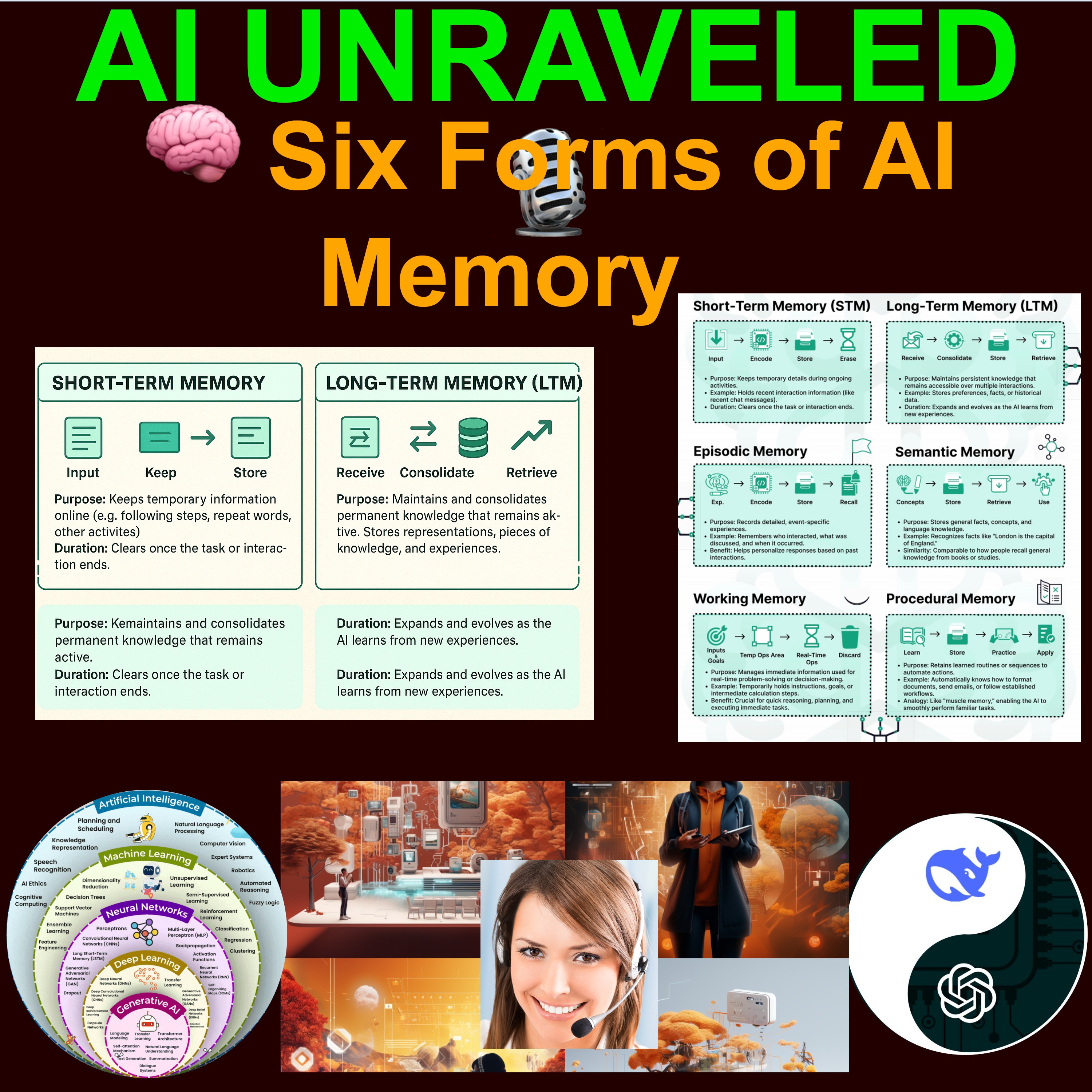
AI Daily Special May 25 2025: 🧠 Six Forms of AI Memory

AI Unraveled: Latest AI News & Trends, GPT, ChatGPT, Gemini, Generative AI, LLMs, Prompting
Deep Dive
Shownotes Transcript
Welcome back to AI Unraveled. This is the show created and produced by Etienne Newman. He's a senior engineer and fun fact, a passionate soccer dad up in Canada. That's right. And if you're trying to really get your head around artificial intelligence,
You are definitely in the right place. And hey, if getting AI certified is on your radar, maybe boosting your career, you should really check out Etienne's prep books. He's got them for Azure AI Engineer Associate, Google Cloud Generative AI Leader, AWS Certified AI Practitioner, and Azure AI Fundamentals. Quite the lineup. Yeah, they're all over at djamgate.com. We'll put the links in the show notes, of course.
So today we're diving into something fundamental, AI memory, how these systems actually interact.
remember things. Right. It's not just about crunching numbers. AI needs to hold on to information, use it. That's like core to its intelligence. Totally. So we're looking at a piece from AI Daily News, Six Forms of AI Memory. Our plan is to kind of unpack these ideas so you can see why memory is so critical. And don't forget to hit like and subscribe if you find this useful. OK, so let's start with the first one they mention, short term memory. Right. Short term. What's the quick take on that? Think really temporary storage like
The info an AI uses just for the immediate task at hand, maybe in a chat window you give it a few commands. It holds those just for that conversation. Close the window or finish the task and poof, it's gone. Very in the now. Got it. Like a mental sticky note that gets tossed. So then what about working memory? Sounds similar, but...
But how's it different? It is similar in being temporary, but working memory is more active. It's like the A.I.'s mental workbench or scratch pad. It's where the A.I. is actively, you know, manipulating information, making calculations, figuring things out in real time to solve a problem, not just holding it, but working with it. So it's doing stuff with the information, not just storing it for a second.
Exactly. And once the problem solver, the process is done, that workspace clears out to, you know, understanding these kinds of core concepts is really vital if you're going for A.I. certifications. Etienne's books, they really help clarify these foundational bits. Makes sense. OK, processing space. Now, long term memory. That sounds like where the actual knowing comes in for A.I., right? That's definitely where the persistence is.
Long-term memory is for storing information over, well, the long-term. Things like your preferences, past interactions, learned facts, or behaviors. So this is how an AI can seem to, like, know me over time. Precisely. It builds that history, that context, allows for personalization, makes interactions feel less transactional. Right. Okay. Then they mention episodic memory. What's that about? Remembering episodes. Like TV shows. Huh. Not quite. It's a
It's about remembering specific events or instances, like recalling the details from a particular meeting you had with it, who said what, maybe the more points discussed. Oh, interesting. So specific moments in time. Yeah. It gives the AI context based on past specific interactions, not just general knowledge, but memories of distinct episodes. Cool. Okay, next is semantic memory. Sounds more like...
General knowledge. You got it. Semantic memory is the AI's database of facts, concepts, and the logical relationships between them. You know, stuff like Paris is the capital of France or the sky is typically blue. The foundational knowledge. Exactly. It's the stuff that
AI knows consistently. And again, for a solid base in AI, resources like Etienne's Azure AI Fundamentals book really cover this kind of core knowledge well. Good to know. All right, last one. Procedural memory, learning procedures. Basically, yeah. It's how AI learns and automates tasks, especially repetitive ones.
Think about it mastering how to, say, format a document consistently or how to handle a standard customer support ticket. Like muscle memory, but for AI tasks. Kind of, yeah. Once it learns the procedure, it becomes automatic efficient. Okay, so quick recap. Short term is immediate. Working is the active scratch pad. Long term is persistent knowledge and history. Episodic remembers specific events. Semantic is general facts and logic.
And procedural is learned actions. That's quite a range. It really is. And when you think about all these different ways AI can remember, I mean, what possibilities does that open up in your mind? What kind of applications could really benefit? Yeah, it definitely gets you thinking. Which type do you think will be the biggest game changer going forward?
It's a tough question. And folks, if you want to get a deeper grasp on these concepts, maybe for your career or just curiosity, seriously, check out Etienne Newman's certification prep books, Azure AI Engineer, Google Cloud Gen AI Leader, AWS AI Practitioner, Azure AI Fundamentals. Find them at djamgate.com. The links are right there in the show notes.
So it leads to a pretty big thought, doesn't it? As these different types of AI memory get better and maybe more integrated. Yeah. How is that going to change how we interact with these systems day to day? What new things become possible? Exactly. It becomes commonplace. Definitely food for thought. Well, that's our time for this deep dive on AI Unraveled. Thanks for tuning in. Please do like and subscribe if you enjoyed it. And we'll catch you next time with more on the world of AI.